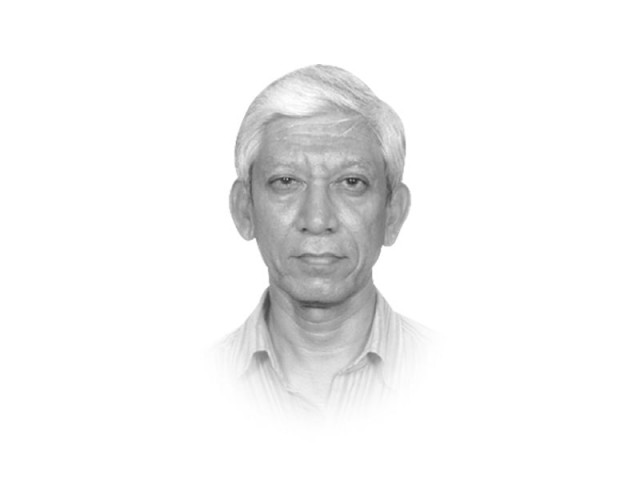Law vs the people
Shouldn’t law be respected and allowed to take its course irrespective of the political situation on the ground?

The seats occupied by these ‘traitors’ were declared as vacant by the legally-constituted institution called the Election Commission. The tale of how these seats were distributed among the political parties on the right side of the legally-formed Martial Law government — PPP, Jamaat-e-Islami, various Muslim Leagues and so on — has been told by Hasan Zaheer in his invaluable book The Separation of East Pakistan: The Rise and Realization of Bengali Muslim Nationalism (OUP, 1997).
What is to be recalled here is the seriousness with which the question of a strictly legal interpretation of the letter of a very limited law used to be debated endlessly. For those supporting the absolutely legal decision of the legally constituted institutions of those unfortunate times, the question of law was a cut and dried one: Is not high treason a serious crime? If a large number of Awami League’s elected members of national assembly are facing such charges — mind it, they have not been convicted as yet — and if they feel they are innocent, why can’t they surrender themselves to the process of law and defend themselves before the courts? Is it fair on the part of these politicians to presume beforehand that the honourable officers manning the legally-constituted courts would not conduct a fair trial and would be prejudiced against the people’s elected representatives? Isn’t it a fact that these very forces had allowed the elections to take place that brought them to the assemblies in the first place? Shouldn’t law be respected and allowed to take its course irrespective of the political situation on the ground? And, finally, isn’t high treason a serious enough charge to be investigated and — if proved beyond any shadow of doubt — shouldn’t the convict be given a fair punishment? How can civilised societies work if the law of the land is not strictly followed by all and sundry? And so on.
It is another matter, however, that the absconding elected representatives of the people had strong and unassailable doubts about such assurances of a fair trial. Based on their observations ever since the famous operation of March 26 had been launched, they knew it for sure that if they land in the fair and safe hands of the officers manning those honourable courts, they were hardly likely to live to tell the tale of justice.
On the other hand, the seats vacated as a result of their disqualification had to be urgently filled through by-elections. The funny — though absolutely legal — drama was staged at Dhaka’s Governor House, where someone called AM Malik used to reside, deluding himself that under the laws then in force, he was supposed to be the governor of the province. Things connected with the lawful by-elections were however handled in the same premises by another character called Major-General Rao Farman Ali. While, for example, the PPP representatives were riding the army helicopters desperately looking for fools who would allow themselves to be nominated as their candidates for the by-elections — let me remind you on the strength of Hasan Zaheer’s testimony that Mian Mehmood Ali Kasuri, the symbol of struggle for human rights and civil liberties and a prominent PPP leader, was one such traveller — Farman Ali was constantly in touch with Islamabad, where the legally functioning Martial Law authorities were deciding which patriotic party should be allowed to field how many candidates for the assembly seats vacated by traitors — well, those accused of high treason anyway.
How many seats a certain party was to be allowed to field its candidates on was an absolutely crucial question. The simple reason was that the legal authorities handling East Pakistan politically, ever since the law and order situation had been satisfactorily brought under control as a result of the well-known operation, were of the realistic view that there was one small thing that would not be possible while conducting the free, fair and impartial by-elections: i.e. polling. The voters, living peacefully under the restored law and order, were not to be disturbed and bothered to come to their respective polling stations to fill the seats of those who had been unseated by authorities respecting the law of the land.
The by-elections that were conducted with an exemplary sense of cooperation among the right-minded parties and the legal authorities in Islamabad and Dhaka have the as-yet-unsurpassed honour of being the most peaceful elections ever conducted anywhere in the world. Not only was there no untoward incident resulting in the loss of human life and property — so dutifully and religiously safeguarded by the just and legal rulers of the country — there was not a single bogus vote polled in them. In fact, there were no votes polled, period.
All the candidates declared winners in the 1971 by-elections in East Pakistan were elected unopposed. How were such neat and clean results brought about? Simple, by following the strictly legal and fair election rules that allow an opposing candidate to take back his nomination papers within the time limit legally notified by the election commission. The legal authorities of those times, working under the able and inspiring leadership of Major-General Rao Farman Ali, must be given credit for he conducted these most peaceful elections that threw up the most positive results possible under the circumstances. However, the results of these legally conducted polls could not be enforced because the whole thing was disturbed by an unfortunate event that took place at Dhaka’s Ramna Race Course on the afternoon of December 16, 1971.
Published in The Express Tribune, January 21st, 2012.














COMMENTS
Comments are moderated and generally will be posted if they are on-topic and not abusive.
For more information, please see our Comments FAQ